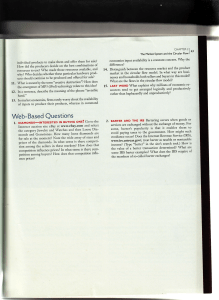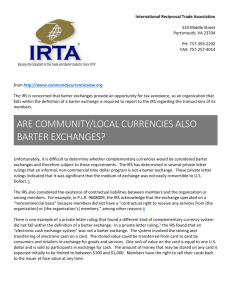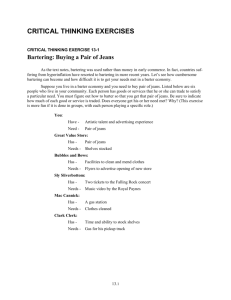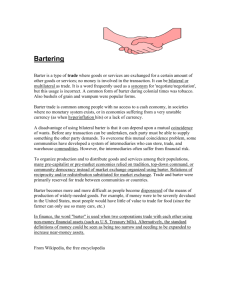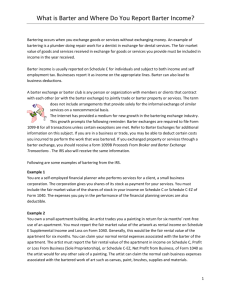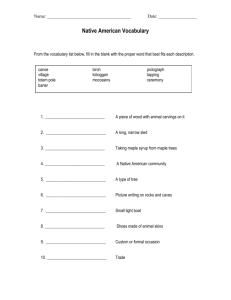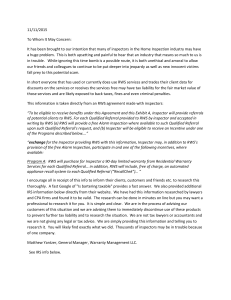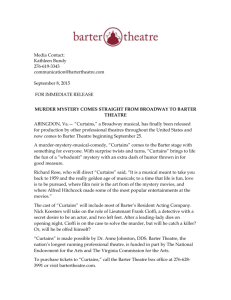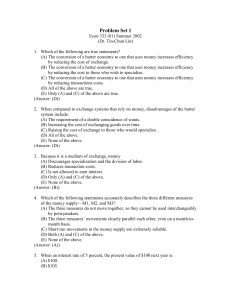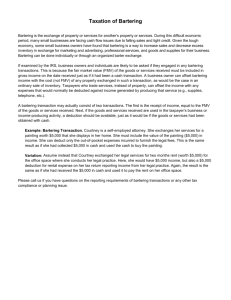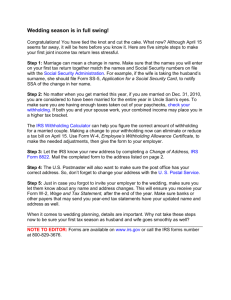Bartering and the IRS - (formerly NM Urban) Homesteader
advertisement
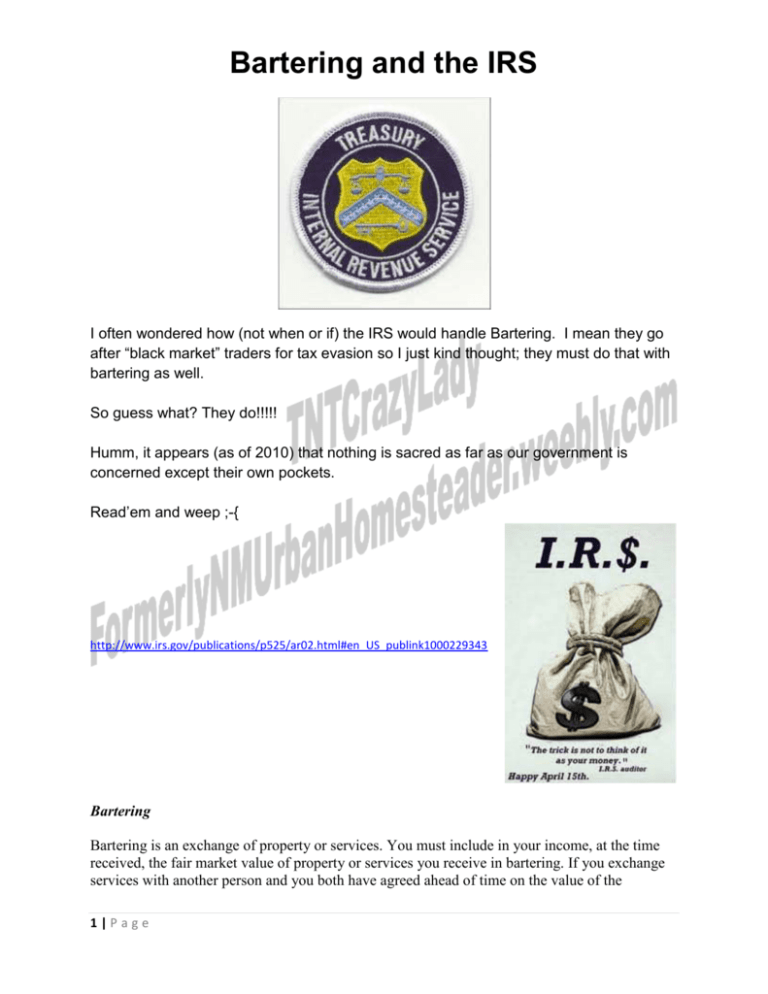
Bartering and the IRS
I often wondered how (not when or if) the IRS would handle Bartering. I mean they go
after “black market” traders for tax evasion so I just kind thought; they must do that with
bartering as well.
So guess what? They do!!!!!
Humm, it appears (as of 2010) that nothing is sacred as far as our government is
concerned except their own pockets.
Read’em and weep ;-{
http://www.irs.gov/publications/p525/ar02.html#en_US_publink1000229343
Bartering
Bartering is an exchange of property or services. You must include in your income, at the time
received, the fair market value of property or services you receive in bartering. If you exchange
services with another person and you both have agreed ahead of time on the value of the
1|Page
Bartering and the IRS - Continued
services, that value will be accepted as fair market value unless the value can be shown to be
otherwise.
Generally, you report this income on Schedule C or Schedule C-EZ (Form 1040). However, if
the barter involves an exchange of something other than services, such as in Example 4 below,
you may have to use another form or schedule instead.
Example 1.
You are a self-employed attorney who performs legal services for a client, a small corporation.
The corporation gives you shares of its stock as payment for your services. You must include the
fair market value of the shares in your income on Schedule C or Schedule C-EZ (Form 1040) in
the year you receive them.
Example 2.
You are a self-employed accountant. You and a house painter are members of a barter club.
Members get in touch with each other directly and bargain for the value of the services to be
performed. In return for accounting services you provided, the house painter painted your home.
You must report as your income on Schedule C or Schedule C-EZ (Form 1040) the fair market
value of the house painting services you received. The house painter must include in income the
fair market value of the accounting services you provided.
Example 3.
2|Page
Bartering and the IRS - Continued
You are self-employed and a member of a barter club. The club uses credit units as a means of
exchange. It adds credit units to your account for goods or services you provide to members,
which you can use to purchase goods or services offered by other members of the barter club.
The club subtracts credit units from your account when you receive goods or services from other
members. You must include in your income the value of the credit units that are added to your
account, even though you may not actually receive goods or services from other members until a
later tax year.
Example 4.
You own a small apartment building. In return for 6 months rent-free use of an apartment, an
artist gives you a work of art she created. You must report as rental income on Schedule E (Form
1040) the fair market value of the artwork, and the artist must report as income on Schedule C or
Schedule C-EZ (Form 1040) the fair rental value of the apartment.
Form 1099-B from barter exchange. If you exchanged property or services through a barter
exchange, Form 1099-B, Proceeds from Broker and Barter Exchange Transactions, or a similar
statement from the barter exchange should be sent to you by February 16, 2010. It should show
the value of cash, property, services, credits, or scrip you received from exchanges during 2009.
The IRS also will receive a copy of Form 1099-B.
Backup withholding. The income you receive from bartering generally is not subject to regular
income tax withholding. However, backup withholding will apply in certain circumstances to
ensure that income tax is collected on this income.
3|Page
Bartering and the IRS - Continued
Under backup withholding, the barter exchange must withhold, as income tax, 28% of the
income if:
•
•
You do not give the barter exchange your taxpayer identification number (generally a
social security number or an employer identification number), or
The IRS notifies the barter exchange that you gave it an incorrect identification number.
If you join a barter exchange, you must certify under penalties of perjury that your taxpayer
identification number is correct and that you are not subject to backup withholding. If you do not
make this certification, backup withholding may begin immediately. The barter exchange will
give you a Form W-9, Request for Taxpayer Identification Number and Certification, or a similar
form, for you to make this certification. The barter exchange will withhold tax only up to the
amount of any cash paid to you or deposited in your account and any scrip or credit issued to you
(and converted to cash).
If tax is withheld from your barter income, the barter exchange will report the amount of
tax withheld on Form 1099-B, or similar statement.
4|Page
